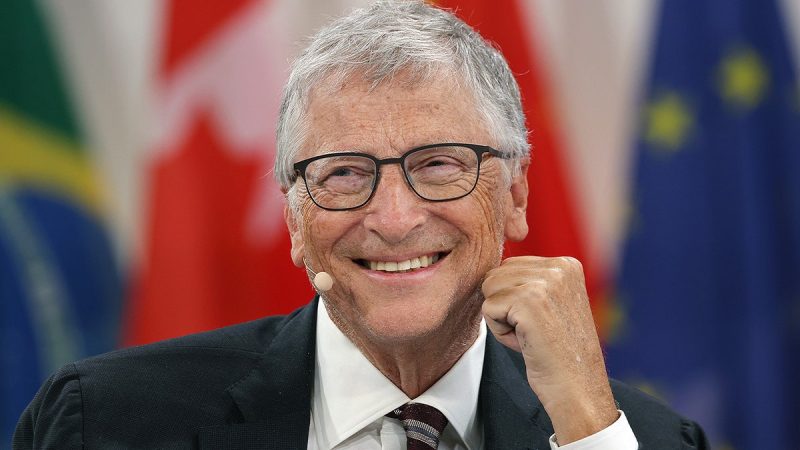The UN Climate Change Conference, COP30, starts Nov. 6 with a world leader summit and runs to Nov. 21. It will emphasize ‘the urgency of the climate crisis and the need for accelerated and collective climate actions.’ However, Microsoft founder Bill Gates just issued a memo aimed at COP30 attendees proposing a fundamental shift in priorities: focus on poverty reduction rather than climate modification.
Gates, who previously gave primary importance to measures to reduce near-term emissions, has drawn criticism for arguing that ‘a metric that should count even more than emissions and temperature change [is] improving lives. Our chief goal should be to prevent suffering, particularly for those in the toughest conditions who live in the world’s poorest countries.’
His argument rests on three key premises: climate change poses serious challenges but does not represent an existential threat to civilization; temperature metrics alone inadequately measure climate-related progress; and improved health and economic prosperity provide the most effective defense against climate change.
Gates provides data to show that achieving net-zero emissions would result in a 1.9-degree Celsius temperature increase from 1990 levels, while inaction would produce a 2.9-degree increase. This one-degree differential, he argues, suggests that resources allocated toward net-zero goals might yield greater humanitarian benefits if redirected toward energy access and disease prevention.
The correlation between energy consumption and economic prosperity is striking. Nations with annual per capita incomes below $1,145 consume approximately 1,100 kilowatts per person annually, while those exceeding $14,005 in per capita income utilize 55,000 kilowatts per person annually, according to data cited by Gates.
The genuine inequity, Gates contends, lies in human development disparities. A child born in South Sudan faces mortality risks 39 times higher before age five compared to a Swedish child. These vulnerable populations require enhanced access to energy, nutrition and healthcare infrastructure.
The relationship between economic development and energy consumption is unequivocal: no nation has achieved high per capita income with low per capita energy usage, and conversely, no country maintains high energy consumption alongside persistent poverty.
Increased energy access facilitates improved living standards through enhanced productivity, agricultural advancement and household consumption, thereby reducing dependence on subsistence farming. Energy availability either provides farmers with modern agricultural technologies or enables economic mobility to pursue alternative livelihoods.
High-energy nations benefit from superior healthcare infrastructure and water sanitation systems, resulting in reduced maternal and child mortality rates and greater capacity for environmental protection measures.
Hurricane Melissa’s destruction in Jamaica illustrates how natural disasters inflict disproportionate damage on developing nations compared to wealthy countries, due to disparities in energy infrastructure, resilient construction and recovery capabilities. Affordable energy access is essential to addressing these inequalities.
Energy poverty in many African and Latin American nations drives migration pressures, as residents seek higher living standards in fossil fuel-rich regions, particularly Europe and North America.
To support emerging economies and alleviate migration pressures, President Donald Trump has reversed restrictions on loans to developing countries for fossil fuel energy projects. Financial institutions are no longer compelled to finance exclusively renewable energy initiatives.
The 140 private banks from 44 countries that participated in the United Nations Net Zero Banking Alliance — including Barclays, JP Morgan Chase and Sumitomo — have suspended their commitments to restrict fossil fuel financing. The World Bank, which has historically discouraged fossil fuel and nuclear power lending while prioritizing renewables, may reassess its position.
This policy shift enables developing nations to secure financing for conventional power plants, transmission infrastructure, distribution networks and household connections. Importantly, this change diminishes China’s strategic advantage in lending to African and Latin American nations — often securing ports and other assets as collateral.
Gates’s reversal in the climate debate challenges the international community to confront an uncomfortable reality. While climate conferences convene in developed nations with reliable electricity and healthcare systems, billions lack access to the energy that makes such gatherings possible.
His argument suggests that the most effective climate strategy may be ensuring that vulnerable populations have the resources to adapt and thrive, rather than pursuing emissions targets that may perpetuate the very poverty that exacerbates climate vulnerability. Whether policymakers at COP30 will heed this message remains uncertain, but Gates has succeeded in reframing the conversation around what climate action should ultimately serve: economic progress, not merely atmospheric targets.

